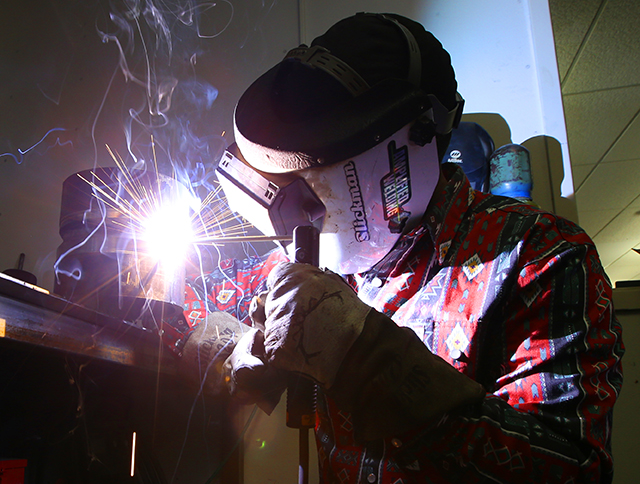Andrew Yang’s increasingly normal campaign
Published 2:56 pm Sunday, December 15, 2019
IOWA CITY, Iowa – It had the trappings of an Andrew Yang rally: the 20-somethings in MATH hats, the fans handing out thousand-dollar Yang bills, the “Truckers for Yang” semi parked outside.
But Yang was trying something different – a low-key “autism and family conversation,” anchored by his wife, Evelyn. More than 100 Iowans had crammed into a cafe with no WiFi to hear the Yangs talk about their autistic son and swap stories with parents nervous about how the world would treat their children.
“We’ve all been collectively brainwashed to think that economic value and human value are the same things,” Yang said. “And one of the traps that special-needs families fall into is to say, well, if you had the right organization or employment opportunity, then my son or daughter would be able to contribute. That is very true. But that should not be the point.”
Yang, whose campaign has outlasted those of two senators, three governors and five current or former members of Congress, had started with a gimmick. He was an “Asian man who wants to give everyone $1,000,” an evangelist for a universal basic income, or UBI, which was more than most candidates got known for.
“We’re trying to reach out to people here in Iowa that might not see me on a podcast,” Yang said in an interview. After one event, he looked into TV cameras and named a few of the podcasts that helped him rise: Joe Rogan’s show and “Freakonomics.”
It had been enough to get him into every DNC-approved debate, including the one scheduled for next week in Los Angeles. But Yang thought that for him to win, voters needed to see who he really was and how much more his presidency could do for them.
“We’re trying to reach people who just tune in to local news, or are part of a veterans community, or religious community, or a moms group,” Yang said on his campaign bus, next to a Super Nintendo that had been brought on when the candidate asked staff for something fun. “We’re trying to reach different people where they are.”
In the final 24 hours of his bus tour, which had stretched over five days, Yang held a traditional town hall, a charity food drive, a roundtable with business leaders, a traditional rally, a visit to a diner and a crowded conversation about autism. As the tour rolled through, his campaign team was on the lookout for “boomers” – older voters, the kind who always caucus, the kind who may not be aware of the Yang dance challenges on TikTok.
“We’re putting out more chairs,” said Yang’s campaign manager, Zach Graumann, as volunteers cleaned up after the event in Dubuque. More chairs meant more older voters; more chairs meant that the campaign was reaching beyond its online base.
Four candidates are bunched up at the top of polls in Iowa. Yang is not one of them. He barely qualified for the December debate, thanks to a national Quinnipiac poll released right before this week’s deadline, and none of his rivals feel the need to attack him or pry his votes away.
That has made him intriguing to voters who are not comfortable supporting former vice president Joe Biden, whose debate performance has worried them, or Sen. Bernie Sanders, I-Vt., who they worry is too far left, or Sen. Elizabeth Warren, D-Mass., who might have the same problem. Yang’s biggest idea, the universal basic income, is expensive, and grew out of the left. But it’s easy to explain. Lots of Yang policies are like that, brief but hook-y, and he has not threatened any candidate enough to risk blowback.
Yang also attracts voters who sat out the 2016 election, or gave Trump a try, giving him a small but hardcore base. He’s trying to build on that base with voters who always show up and caucus anyway. Jesse Singerman, 72, said after Yang’s rally in Iowa City that she had leaned toward Sen. Amy Klobuchar, D-Minn., but was beginning to find Yang intriguing.
“He’s got really unique and interesting ideas, and he’s got a compelling personality,” Singerman explained. “I mean, he’s very personable and composed, and he’s got a sense of humor, which is nice to have.”
The universal basic income, $1,000 per month for every American, is still at the center of Yang’s campaign and his speeches. In his final day on the bus, Yang often ran a little late, which required supporters to vamp and describe a candidate whose $1,000-a-month plan had restored their faith in democracy.
The candidate has surrounded that policy with other, less radical ones. His TV ads, produced by the team that had made Sanders’s 2016 ads, set the tone, focusing more on his experience as a start-up adviser (creating “thousands of jobs”) than on UBI. The ad Iowans have seen the most was about autism, with Andrew and Evelyn Yang talking about their youngest son’s needs and why they supported what he called “Medicare-for-all.” Yang defined that term as an optional government health plan anyone could enroll in, a different definition from what the rest of the field was using, in which Medicare-for-all would replace private insurance.
Other candidates suffered when changing the definition of universal Medicare. Yang just wanted voters to notice.
“How many of you are here because you saw our ads?” Yang asked the crowd of 100 or so Iowans at his Friday night event in Dubuque. When just one hand shot up, he deadpanned: “We’ve spent a lot of money on those!”
Yang describes the ads and the other decisions behind his increasingly normal campaign as matters of utility. What got the largest number of voters to think about him and donate to him? What would they pay attention to if he turned their heads?
“What we found when we talked to people was that they didn’t know that much about me and they wanted to know more about me,” Yang said. “That included my family values. They were actually more excited about universal basic income if they got a sense of who I was.”
The debates, he said, had been useful for introductions to voters and for “deliverables” such as donation bumps. But he’d been frustrated to get questions on so many topics he did not focus on as a candidate.
“It almost seems sometimes like the goal is to ask me questions that are completely unrelated to anything I’ve talked about on the campaign trail publicly,” Yang said. “So I am 100% convinced that our system doesn’t know how to have a conversation about changes in the economy that affect us all.”
When voters grilled him, as they did at a Friday evening town hall in Waterloo, Yang liked to bring those topics back to the “humanity first” ethos: What policies would allow people to live comfortably?
“This would make us stronger, healthier, less stressed out, improve our relationships, give us the chance to spend more time with our kids and give us a chance to actually take care of some of the problems that we’re leaving for our kids,” Yang said, describing UBI.
Other Democrats, closer to a first-place finish, had spent the past few weeks debating the intricacies of each others’ policies and whether their rivals were sincere. Yang stayed out of intra-Democratic arguments, unless he was pushed, as when he lightly criticized Warren’s wealth tax in a debate.
Asked on the bus about South Bend, Indiana, Mayor Pete Buttigieg and his past employment at McKinsey, which had become a target for the party’s left this month, Yang called the consulting firm “one of the great facilitators of the capital efficiency machine,” which sometimes worked against the “worker happiness machine.” Asked about the updated NAFTA trade deal likely to come before Congress, Yang said he would probably support it, before arguing that trade deals focused too much on funds for retraining, which could be inefficient, instead of something direct, like the UBI “freedom dividend.”
“The workers would prefer you’d put the money into their hands,” Yang said. “So I’m for freedom dividend for everyone. And then I would be for taking whatever budget traditionally has gone into retraining programs and just put it directly into affected workers’ hands.”
On Saturday night, Yang closed the tour with a stop at Iowa City’s Hamburg Inn No. 2, shaking hands and taking photos with supporters. It was the now-usual mix: fans who had temporarily rebuilt their lives around him, and voters who had seen him on TV and liked the sales pitch.
“One of the fun things about this campaign is that I think the standards for us are lower,” Yang said. He pictured the election night reports on TV networks, the ones with candidates’ faces next to their vote totals, which made their electoral power seem more real. “If we’re on the board in Iowa, I think many people would be stunned.”
yang-analysis





